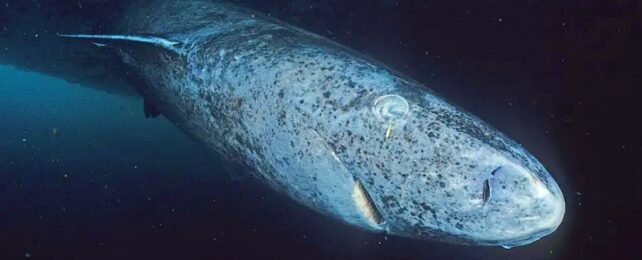Biologists were stunned to find a mysterious cold-water shark thousands of miles away from its natural habitat, according to a recent marine study. A Greenland shark — the longest-living vertebrate on Earth — was discovered in the tropical Caribbean Sea.
Researchers were tagging and temporarily catching tiger sharks off the coast of Belize when they encountered the mysterious shark, said a paper recently published in the science journal Marine Biology.
After setting a line in Belize's protected Glover's Reef Atoll while monitoring and researching tiger sharks, the biologists returned to find their line had moved several miles away from the coral reef into waters as deep as 2,000 feet.
When they retrieved their scientific catch, they were astonished to find the ancient Greenland shark. One of the researchers, Hector Daniel Martinez, remarked, "It looked very, very old," emphasizing its deep-sea habitat.
Initially, the scientists suspected it might be a sixgill shark, a dominant deep-sea predator, but upon photographing the rarely-seen animal, they confirmed its identity as "most likely" a Greenland shark.
"We suddenly saw a very slow-moving, sluggish creature under the surface of the water," Devanshi Kasana, a biologist and Ph.D. candidate at Florida International University's Predator Ecology and Conservation lab, Mashable reported. "It looked like something that would exist in prehistoric times."
Greenland sharks are the longest-living vertebrates on Earth, with an astonishing lifespan of 250 — 500 years, according to the National Ocean Service.
The sharks live thousands of feet underwater in pitch darkness and are rarely seen or photographed, and little detail is known of their incredibly long lives. In the depths of the water, they grow, move, and age slowly. Their energy-conserving, slow-paced lifestyle is an essential adaptation to the nutrient-scarce deep sea.
Finding a Greenland shark near a coral reef off Belize was unexpected but plausible. These obscure sharks thrive in the Arctic's deep seas and could inhabit other deep ocean regions, including the Caribbean.
The nearby reef's slope plunges to depths of up to 9,500 feet, offering a cold and dark environment suited for Greenland sharks.
The discovery raises the question of whether this particular Greenland shark migrated to the Caribbean from Arctic waters or if it spent much of its life in the depths of tropical waters of the region.
It remains unanswered, but there is a strong likelihood that more of these enigmatic creatures roam the dark depths of the Caribbean, hidden from our sight. "I doubt it's the only one," Demian Chapman, director of Sharks and Rays Conservation Research at Mote Marine Laboratory and Aquarium, told Mashable.
"They have to wait more than 100 years to get laid"
The deep seas remain largely unexplored, and the discovery of this Arctic shark serves as a reminder that the ocean and its biosphere are much unknown.
A 2020 study determined via genetic analysis that there are two geographically separate populations of Greenland sharks: One group swims near Canada's Baffin Basin, above the Arctic Circle, while the other occupies waters of the North Atlantic Ocean between Nova Scotia and Svalbard, near Norway.
Greenland sharks are primarily scavengers, eating everything (dead or alive), including fish, seals, polar bears, and whales.
Some can grow to 24 feet long and weigh up to 2,645 pounds (1,200 kilograms), even though they grow only up to 0.4 inches (1 centimeter) annually.
According to a 2016 study, Greenland sharks don't reach sexual maturity until they are at least 134 years old.
"They have to wait more than 100 years to get laid — I'm sure they're not happy about that," Julius Nielsen, a coauthor of that study, told New Scientist in 2016.
This article was originally published by Business Insider.
More from Business Insider: